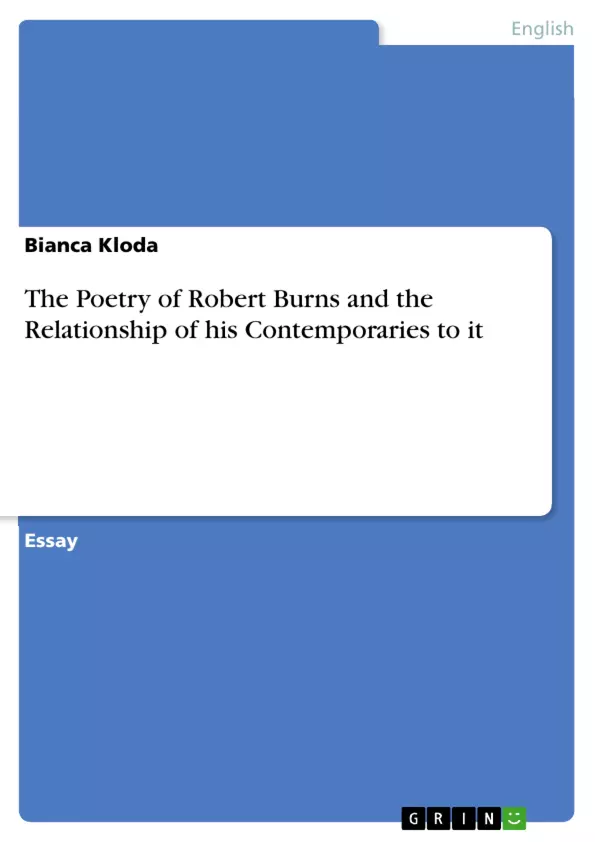Robert Burns, born on the 25th of January in Alloway/Ayrshire, is considered to be the greatest national folk poet Scotland ever had, and he mainly has this status because of his songs. There is hardly anybody in the world that doesn′t know "Auld Lang Syne". Apart from that Burns is considered as the poet of the common people. He wrote poetry that was directly linked to their lives. Is there another poet who wrote poems about lower animals like a mouse or a louse before him?
Today there even is a yearly Burns Supper that is held on his Birthday, where the people meet, have a rather rich meal and recite his poetry and sing his songs.
But is that really all about the Poet, who by some people also is considered as the man who had an impact on the "formation" of romanticism and therefore also on his contemporaries? Of course it isn′t.
In this paper I shall try to show the relationship and the nature of impact Burns′ poetry had on his contemporaries and also the differences of opinion that could even change over the time in one and the same person as the example of William Wordsworth shows.
Inhaltsverzeichnis (Table of Contents)
- The Poetry of Robert Burns and the Relationship of his Contemporaries to it
- Burns' Education
- The Reception of Burns' Early Poetry
- The Critics' Response to Burns' Work
- Burns' Influence on Wordsworth
Zielsetzung und Themenschwerpunkte (Objectives and Key Themes)
This paper examines the impact of Robert Burns' poetry on his contemporaries, focusing on the nature of their relationship and their evolving opinions over time. The paper explores the differences in opinion regarding Burns' education and the reception of his early poetry. It delves into the critical responses to his work, highlighting the controversies surrounding his use of Scots and the evolving perceptions of his poetry.
- The influence of Robert Burns' poetry on his contemporaries.
- The role of education and social class in shaping Burns' poetry.
- The critical reception of Burns' work and the changing perceptions of his poetry.
- The impact of Burns' work on the development of Romanticism.
- The relationship between Burns' poetry and the social and political context of his time.
Zusammenfassung der Kapitel (Chapter Summaries)
- The paper begins by exploring the nature of Robert Burns' education, emphasizing the influence of his father and his teacher John Murdoch. It examines how Burns' education shaped his writing style and his use of language.
- The second section focuses on the reception of Burns' early poetry, particularly his poem "The Cottar's Saturday Night." It analyzes the critical response to the poem's form and language, and how it influenced the perception of Burns as a poet.
- The third section delves into the responses of Burns' contemporaries to his poetry, examining the differing opinions of critics like Thomas Blacklock, Hugh Blair, and William Wordsworth. It discusses the controversies surrounding Burns' use of Scots dialect and the critical debates about his poetry.
Schlüsselwörter (Keywords)
This paper examines the themes of education, social class, language, and criticism in the context of 18th-century Scottish literature. It explores the influence of Robert Burns on his contemporaries and the impact of his poetry on the development of Romanticism. Key concepts include Scots dialect, pastoral poetry, sublime, naturalness, and genius. The paper also refers to specific works by Burns, such as "The Cottar's Saturday Night" and "To a Mountain Daisy," as well as works by his contemporaries, including Wordsworth's "Lyrical Ballads."
Frequently Asked Questions
Who was Robert Burns?
Robert Burns (1759-1796) is the national folk poet of Scotland, famous for his songs and poems written in Scots and English, reflecting the life of the common people.
How did Burns influence the Romantic movement?
Burns is considered a precursor to Romanticism due to his focus on nature, the common man, and intense personal emotion, influencing poets like William Wordsworth.
What was the critical response to Burns' use of the Scots dialect?
Responses were mixed; while some praised its naturalness and authenticity, others found it controversial or difficult, leading to debates about the literary value of vernacular language.
What is a Burns Supper?
A Burns Supper is an annual celebration held on his birthday (January 25th), where people recite his poetry, sing his songs, and share a traditional Scottish meal.
What was William Wordsworth's opinion of Robert Burns?
Wordsworth's opinion evolved over time; he deeply admired Burns' ability to find the sublime in ordinary things, which significantly impacted his own poetic philosophy in "Lyrical Ballads."
- Quote paper
- Bianca Kloda (Author), 2000, The Poetry of Robert Burns and the Relationship of his Contemporaries to it, Munich, GRIN Verlag, https://www.grin.com/document/9756



